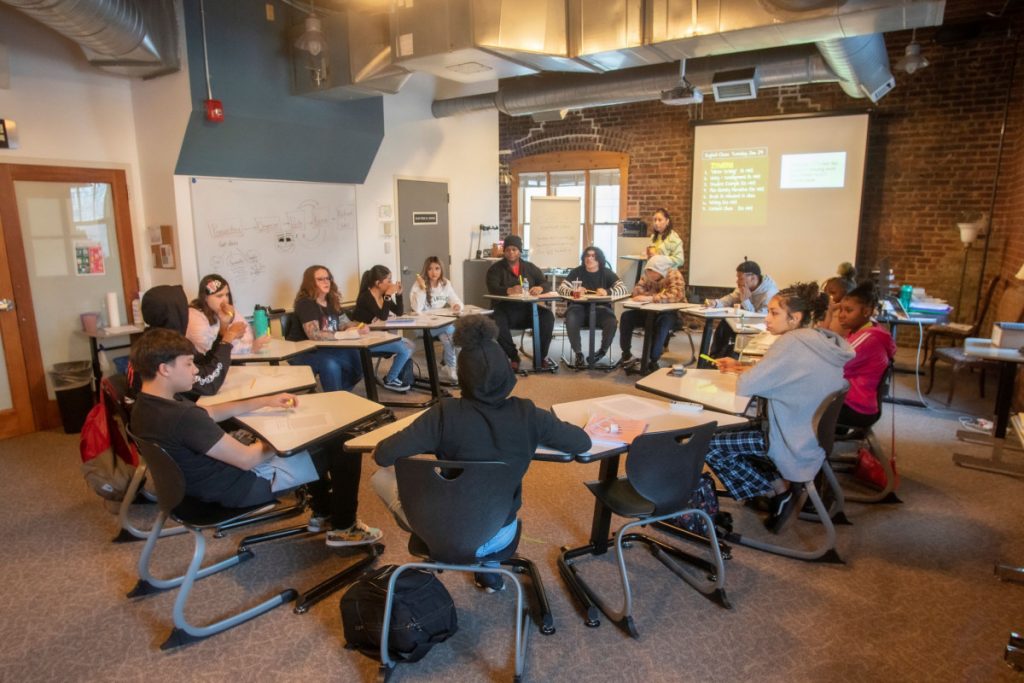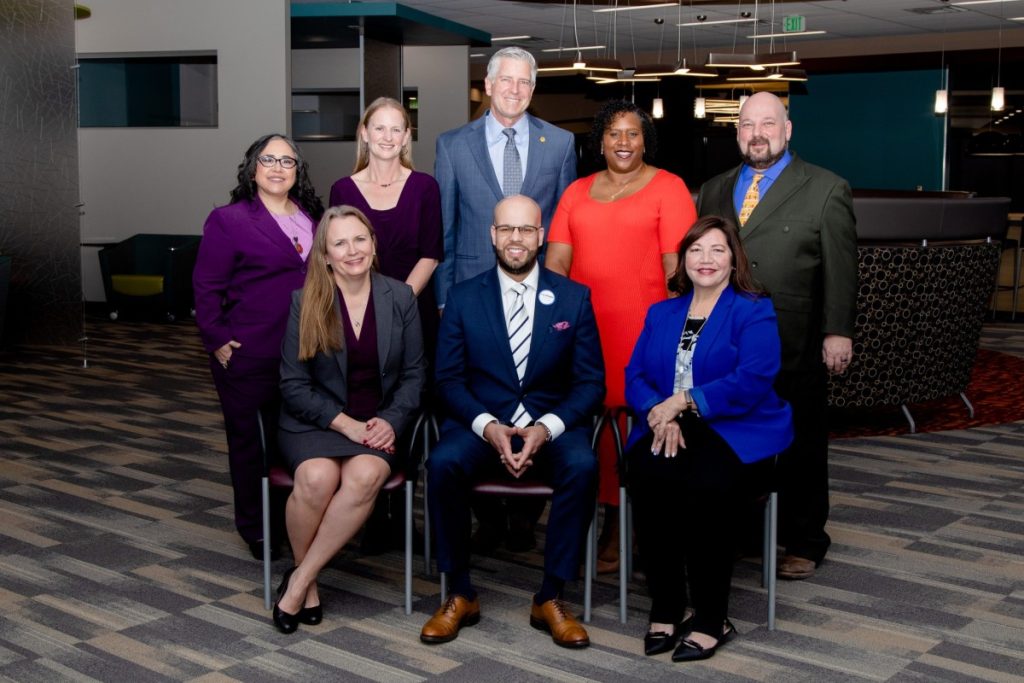Editor’s note: The SHIFT Chronicles is a new monthly feature dedicated to amplifying student voices, where those most impacted by the public education system share their thoughts, reflections, and experiences. In collaboration with FaithBridge SHIFT fellows, these commentaries offer a genuine glimpse into the challenges students are facing within our city’s schools. These students represent a diverse range of schools across the city, each with distinct cultures and expectations, yet all united under the DPS banner. A special thank you to all the student writers who contributed their entries.
This month’s entries focus on student views of what makes a great leader.
Josee Mckinnis, sophomore, DSST Montview High School
“What makes a great leader?” A great leader demonstrates courage, embraces vulnerability, and exhibits perseverance.
While there isn’t a specific set of character traits that define a great leader, courage, vulnerability, and character are essential building blocks for effective leadership.
Courage is an essential quality of effective leadership. Leaders frequently face challenging situations that demand difficult decisions while remaining true to their principles. A notable example is Martin Luther King Jr., who demonstrated exceptional courage in leading the civil rights movement, fully aware of the risks to his life. He showed that courage can overcome fear, illustrating that great leaders prioritize justice over oppression.

Vulnerability is a vital attribute for leaders, as it fosters a secure environment where team members feel safe, are encouraged to take risks and engage in creative thinking. Barack Obama’s willingness to share his personal struggles facilitates a profound connection with the public, establishing a sense of trust. Through this vulnerability, he has garnered public confidence and inspired individuals to adopt more innovative and open-minded perspectives.
Lastly, character is an essential attribute that leaders must possess, as individuals with strong character facilitate the guidance of others toward morally and ethically sound decisions. A pertinent example is Malala Yousafzai, who courageously advocated for her beliefs while uniting like-minded individuals to advance their cause collectively.
As a sophomore in high school, I participated in club soccer, high school soccer, and high school basketball. Additionally, I am a student council member and serve as a co-representative for my class. Balancing these various responsibilities is challenging; however, demonstrating courage, vulnerability and character has proven crucial in enhancing my leadership skills and fostering personal development.
Although embracing courage, vulnerability, and character isn’t always easy, I continually work to improve my leadership skills and create an environment where people feel safe and respected. I recognize that I still have much to learn and improve, but by incorporating courage, vulnerability, and character into my daily life, I am gradually making progress.
Kcarma Montoya, junior, East High School
Growing up, I have always been told to be a leader, not a follower, and that you should do the right thing even when no one is looking.
These lessons have taught me the importance of integrity and responsibility. When you are a leader, you can gain control of the room without trying too hard, and people naturally relate to you, placing their trust in your judgment.
To be an effective leader, you must be open to criticism, adapt to navigating challenges, ensure everyone feels included, and confidently take charge of the situation.

As a child, I often watched PBS Kids, which constantly reinforced these values. The shows I enjoyed taught me essential life lessons about being a leader and embracing yourself and that it’s perfectly okay to be yourself.
Now, at 16, I am actively involved in JROTC, have served as a Balarat counselor, and help run the cooking club at my school. Each of these roles demands some form of leadership.
During my time at Balarat, working with children was sometimes challenging due to their short attention spans. Finding a balance between being firm and friendly became crucial, recognizing that the memories they create in those moments are ones they will cherish for years.
Similarly, JROTC presents its challenges. It’s a large group of high school students, and we run the entire program. In color guard, I hold a leading position where I command the whole team, and they trust me to make the right decisions. The cooking club requires me to plan the upcoming week’s meals and ensure we have enough food for 25-35 people.
Several things have shaped my understanding of leadership, including my time at a youth center, and my mom. The center’s owner has always been a mentor to me, someone I feel comfortable going to for advice. The center’s activities included neighborhood trash clean-ups and learning how to care for horses, and they were designed to teach students about teamwork and responsibility.
However, I believe my mom is the most significant example of leadership in my life. As a single mother, she may not have initially felt prepared to lead, yet she did, doing what was necessary for our family. She consistently demonstrates the importance of being true to oneself while embracing leadership roles.
Leadership impacts the community in various ways, from planning new parks to influencing who becomes the next senator. A good leader strives to push the community toward success and growth. Without effective leadership, communities may struggle to progress, risking stagnation in development and inadequate access to essential resources.
Ultimately, the lessons I have learned about leadership will guide me as I continue to contribute everything I can to my community and inspire others to do the same. I can only speak for myself when I say I am excited to see what future leaders will accomplish for us.
Lily Becker, sophomore, George Washington High School
When you look back at America’s influential and powerful leaders, whom do you think of?
America’s first president, George Washington, Abraham Lincoln, or what about Alexander Hamilton? He wasn’t a president, but was he still a leader? What makes a good leader?
All these influential figures share many things that make them good leaders, but modern-day leaders share the same qualities. To be a good leader, one has to be responsible and understand that each decision/action will have good and bad consequences.

Good leaders must understand that they are not one person anymore; they are an idea that the people put hope and trust into, an idea the people rely on to make the best choices for them. Leaders represent the identity of the people while being level-headed to make reasonable and responsible decisions for the people they are supposed to be equally representing.
Being forgiving and resilient at the same time is a quality of an excellent leader, someone who can forgive the actions of others while still staying strong, not wasting the hope and belief the people put into them.
Students are learning these qualities to become excellent and reliable leaders by understanding the idea of real responsibility along with consequences. I am learning about different and complex ethical frameworks in school that my peers and I can utilize in the real world.
If in the future I consider becoming an influential figure and take the role of a leader, I would take advantage of what I’m learning now in school, using all three of the ethical frameworks (Utilitarian ethics, virtue ethics, Kantian ethics) to consider as well as evaluate future decisions by analyzing what would be the best option for the people that I represent.
My colleagues and I went to Washington, D.C., to visit the Holocaust Museum. We witnessed the atrocities that a leader with mass, corrupt influence can create. A corrupt leader can have as much influence as a good, responsible leader.
That’s why it’s so important to learn what makes an upstanding leader at an early age, to learn what is acceptable and what isn’t in life and society.
Many things make a good leader, but ultimately, it depends on how one is taught to be a leader.
Jose Orenday, junior, Denver West High School
When I think of great leaders, I think about the adults in my life.
When I say this, I’m not talking about my teachers or family, but a great leader starts with not being related to them. When I say, “not related,” I mean someone with little to nothing to do with your life. Someone who has no direct stake in your success, achievement, or progress, but they do it because they are alive to lead.
For example, I have a mentor who I met because he was my teacher’s husband. He did not have a direct stake in my development or success, but he chose to mentor me and help me. All because he was alive to lead.
What makes leaders leaders is that they don’t have to motivate or lead you; they just have to step up to the task. They didn’t have to be concerned. They could’ve look the other way, but they choose you out of anyone, and as they choose you, they decide to invest their time, take responsibility, and lead you.

I think a great leader should be willing to teach. This sounds simple and obvious, but it’s one of the most important things.
Why would I listen to some middle-aged man if they have nothing to teach? An example of this would be how my mentor taught me to claim responsibility. Since I’ve learned this, I have always tried to apply it to my everyday life as a student, son, older brother, classmate, and worker.
I have taken that lesson everywhere I go and have not let go because it has permanently changed my life. When I’m with my siblings, I now have a new perspective. A perspective to have a responsibility and act as a “parental figure” to my sibling since we only have my mom, and she’s too busy working for us.
Because of my mentor’s lesson, I’ve learned to chase my passions but balance them with my responsibilities as a man, son, and brother.
One last key thing a great leader should have is life experience. How am I going to take some guy seriously if he has never struggled? It’s like having a baby managing a multi-million-dollar business. This is obvious again, but that is just how it is without experience.
You should have respect for someone taking the role of your “leader.” Most people in my life have told me their stories of how they ended up here. Because of their story, I’ve chosen them to be role models in my life and my siblings’ lives.
I don’t think I could be any type of leader anytime soon, but as long as I stick to being the best I can be every day, I think it’s possible.
All these things should be obvious but they’re obvious for a reason, because they work. Using this format and a couple of other key factors that are important in a great leader, I think you can find a great leader for yourself no matter who you are.
Sophia Y. Shon, senior, Thomas Jefferson High School
The qualities of a great leader are pretty simple: empathy, accountability, ambition, and respect.
A leader needs to be empathetic because of the perspectives this quality gives them. Everyone comes from different backgrounds, and each background offers unique perspectives. These perspectives make teams, classrooms, and other spaces more special, which is why these spaces need an empathetic leader.
They need someone who can walk into a room with open ears, listen to everyone’s opinion, and make an informed decision. Without differing standpoints or ideas that challenge their own, a leader is just a one-man ship.
Another quality that a great leader has is the ability to take accountability for themselves. It is natural for any person to be defensive, but the wall that a person builds up out of self-protection can also push others away. No one, especially youth, wants to be led by someone who refuses to take accountability for their actions because it creates a negative perception of the person in charge.

This negativity makes the leader unreliable and ultimately useless to a team. For this to be prevented, a leader needs to be able to take accountability for their mistakes and take critiques to better their team as a whole.
A leader should be ambitious, with empathy and accountability. Many things in society were born from ambition. Ambition is an important accelerator for initiatives to be fulfilled and for societies to progress, which makes it so important in a leader. If a leader has no ambition, then there will be no progression in a group, and the goals that they aspire to accomplish will never be achieved.
The final, and most important quality of a great leader is respect. Respect is not only pertinent to everyday life, but it is essential in a leader. If a leader cannot have respect for those they lead, they are not a leader.
As society has demonstrated, a lack of respect is degrading and regressive. For us to advance and achieve our goals, respect is required. No team member should feel they are not welcomed or heard because it ruins the culture and momentum that a group can hold.
Regarding how I am learning to be a leader and carry these qualities in my daily life, I learned a lot about how to be a leader from school. Leading the JROTC team has changed my views greatly on leadership and emphasized the aspect of ambition in leadership. For my Honor Platoon team to win competitions and compete in nationals, I need to demonstrate this ambition to accomplish big things, or the girls won’t take the team seriously. As the Battalion Commander of JROTC at Thomas Jefferson, I need to demonstrate my desire to pass our extensive Inspection on December 4 to energize the staff/cadets.
Additionally, being led by teachers, staff, and more, I have learned through their mistakes and triumphs the qualities a leader must possess. I’ve learned through the way staff members treat kids that people feel valued when they are respected, and kids respond better to being treated like people.
Through how my favorite teachers interact with me, I respond best to leaders who listen to my feelings and stories. Through my admiration for teachers, I’ve learned that I respect those who can admit when they are wrong and apologize for not achieving the standard they set for themselves/the class.
Through my school, classes, and extracurriculars, I have expanded my knowledge greatly about what a leader should be like and feel more confident in my abilities as a leader.




